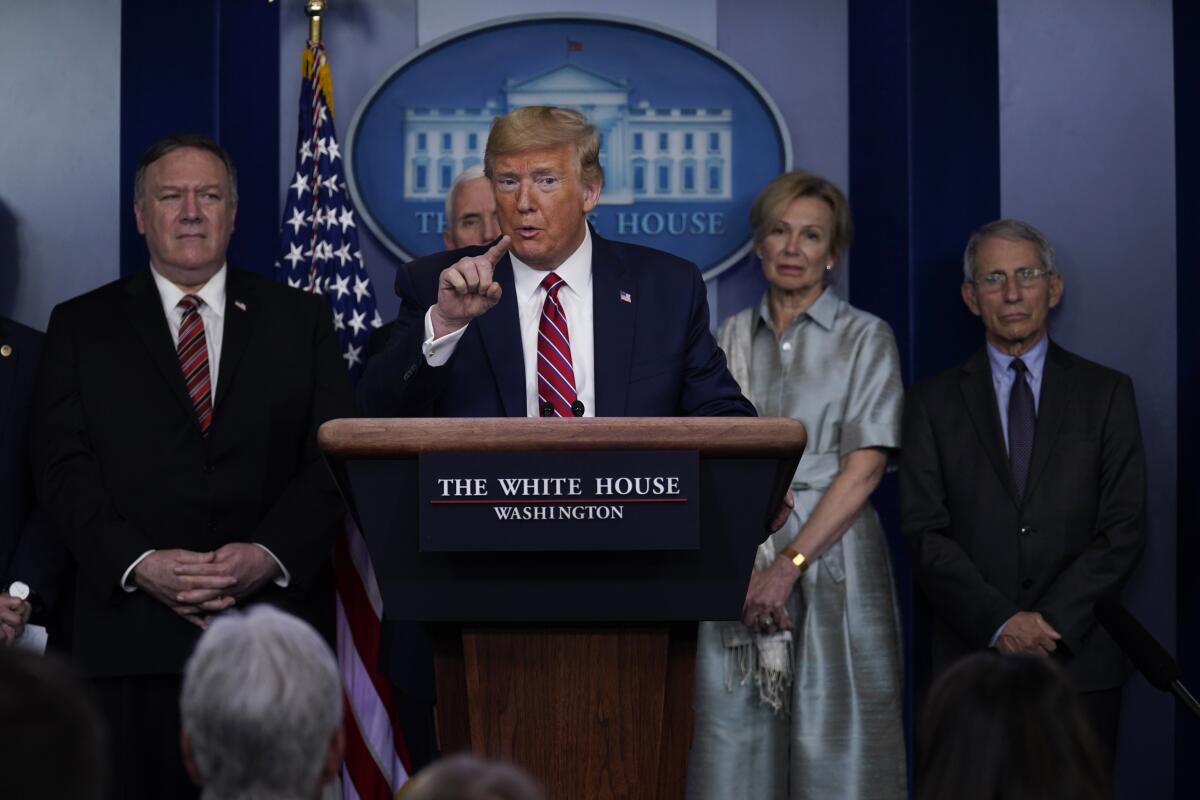U.S. to bring home stranded Americans using planes that deport immigrants

- Share via
WASHINGTON — With pressure mounting over Americans stranded outside the United States because of coronavirus-related travel restrictions, the government plans to use its planes that deport migrants to bring U.S. citizens home, a senior administration official said Monday.
The use of repurposed deportation flights is one of several actions the State Department is taking to retrieve thousands of Americans grounded in foreign countries since the U.S. began closing its borders and barring arrivals from some nations, in an effort to slow the spread of the highly infectious virus. At the same time, commercial airlines dramatically cut back on flights.
“We’re working around the clock to bring U.S. citizens who are stranded overseas back home,” a senior State Department official said, briefing reporters by phone on grounds of anonymity, in keeping with administration protocol. Consular staffs “have been working night and day to help Americans get on flights.”
About 5,000 American citizens in 17 countries have been transported back to the U.S. in recent days through a fleet of commercial, charter and U.S. military flights, the official said. Another 13,500 have asked for help, and 16 more flights are scheduled for the coming days.
Some travelers in Central America were taken home in U.S. Air Force aircraft that were already in the region on routine missions.
In considering other options, the government decided to take advantage of flights commissioned by the Department of Homeland Security to deport thousands of Central American and Mexican migrants who either entered the U.S. illegally or were attempting to seek asylum, the official said. It was not clear if either the migrants or the returning American travelers were getting any medical screenings.
The use of deportation flights, which the administration revealed Monday only under questioning, seemed an unusual move. Some officials in the Central American countries where the U.S. has deported the most migrants have started to bar the flights, citing a fear of spreading disease. Guatemala briefly stopped the flights last week. But the Trump administration has been determined to continue the deportations.
Jesse Curry, 38, a software developer from Tampa, Fla., was vacationing in Lima, Peru, when the crisis erupted and that country’s government shut borders. His numerous flight rebookings were canceled one after another, he said, and only on Saturday was he able, after many efforts, to reach a U.S. official who could help. He submitted information to the U.S. Embassy for himself, his wife, two children, and his mother to eventually get on a flight.
In the meantime, Curry said, he and his family have done their best to stock their Airbnb rental property with provisions and to avoid the streets. “There is a ton of uncertainty,” Curry said in a phone interview from the seaside Lima neighborhood of Miraflores.
Numerous members of Congress complained to Secretary of State Michael R. Pompeo that their constituents were stranded from Peru to Morocco and unable to find assistance in U.S. embassies and consulates abroad. Many U.S. diplomatic missions have been forced to curtail services because of the pandemic.
Sen. Bob Menendez of New Jersey, the senior Democrat on the Senate Foreign Relations Committee, wrote Pompeo late last week to demand that the State Department plan additional flights and invoke regulations allowing it to do so.
Some lawmakers’ ire peaked over the weekend when Pompeo tweeted that he and his wife, Susan, were staying at home working puzzles as their form of social distancing.
“When you’re done with that puzzle, could you please help get my 30+ constituents out of Peru, Guatemala, and other countries where they are stuck right now and getting little or no help from our State Department!?” Rep. Jared Huffman (D-Calif.) responded, also via Twitter. “That’s a solvable puzzle if we have a competent State Department.”
Staff writers Jennifer Haberkorn and Molly O’Toole contributed from Washington.
More to Read
Get the L.A. Times Politics newsletter
Deeply reported insights into legislation, politics and policy from Sacramento, Washington and beyond. In your inbox three times per week.
You may occasionally receive promotional content from the Los Angeles Times.











